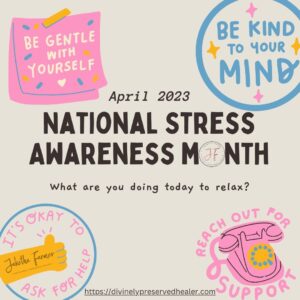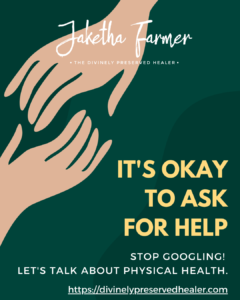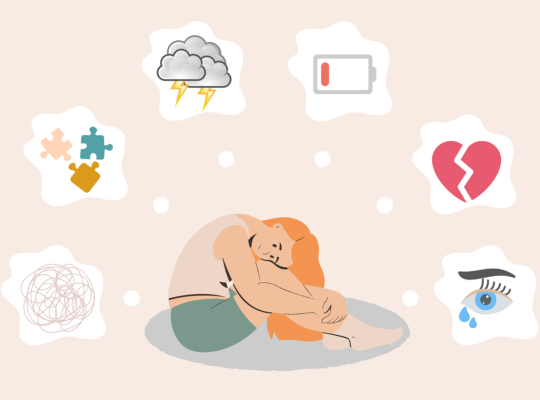 Everyone goes through it, no one is exempt from it. Stress serves as the “spice of life” flavoring every part of our emotional, physical, psychological, and physiological well-being. It acts as an energetic current, flowing through every aspect of our lives, sometimes without rhyme or reason. Sometimes it is within our control and sometimes it isn’t. Regardless of its source, its impact could last for a fleeting moment (acute stress), or for the long haul (chronic stress) producing physical manifestations of sickness and diseases if left unchecked. Of course, there is no cure for stress, we can only learn how to process our experiences, by moving through and if possible, out of whatever we are stressing over.
Everyone goes through it, no one is exempt from it. Stress serves as the “spice of life” flavoring every part of our emotional, physical, psychological, and physiological well-being. It acts as an energetic current, flowing through every aspect of our lives, sometimes without rhyme or reason. Sometimes it is within our control and sometimes it isn’t. Regardless of its source, its impact could last for a fleeting moment (acute stress), or for the long haul (chronic stress) producing physical manifestations of sickness and diseases if left unchecked. Of course, there is no cure for stress, we can only learn how to process our experiences, by moving through and if possible, out of whatever we are stressing over.
The National Center for Complementary and Integrative Health (NIH) defines STRESS:
Stress is a physical and emotional reaction that people experience as they encounter challenges in life. When you’re under stress, your body reacts by releasing hormones that produce the “fight-or-flight” response. Your heart rate, breathing rate, and blood pressure go up, your muscles tense, and you sweat more. Occasional stress is a normal coping mechanism. However, long-term stress (also called chronic stress) may contribute to or worsen a range of health problems including digestive disorders, headaches, sleep disorders, and other symptoms. Stress may worsen asthma and has been linked to depression, anxiety, and other mental illnesses.
Common Signs and Symptoms of Stress
If you are questioning whether or not what you are dealing with is stress, there is a good chance that is what it is. However, if you are still not sure, there are several different signs that will help you confirm it. Look out for these emotional and physical symptoms to show up in your daily life.
Symptoms You May Experience
First, let’s take into account any emotional symptoms you have. Many of these resemble those of anxiety or depression. These include fearfulness, moodiness, restlessness, feelings of being tense or overwhelmed, and feeling like you are losing control. Stress can also manifest itself in feelings of loneliness and worthlessness that simply won’t go away. Besides these, a strong desire to avoid the company of others and difficulty focusing on tasks are also possible. At its worse, you may also have suicidal thoughts, or at least, experience more anxiety than you normally would, while feelings of guilt and shame lie somewhere in the middle.
If you have been getting a lot of headaches lately, stress could very well be the culprit. Insomnia and disruptive dreams go hand in hand with this condition, as well. Ringing in the ears (tinnitus), incredibly low energy, and uncomfortable chest pain are all undesirable symptoms of stress. Forgetfulness, an increased or decreased appetite, stomach problems, constipation, and nausea are also quite common. If you find that you’re experiencing several of these on a regular basis, your assumption that it is stress is quite plausible, but have yourself checked out by your licensed medical professional to rule out/address any more serious conditions.
Signs You Might See
As for the symptoms that are visible to the naked eye, there are a few that you want to be paying close attention to, in order to help you figure out just what’s going on with you. You should be on the lookout for panic attacks that often manifest themselves through trembling lips, shaking hands, frequent blushing, or sweating. You may also experience a dry mouth, sweaty hands, or any kind of sudden muscle spasm. Aside from these, you might break out in hives and get unexplained rashes or itchiness. A clenched jaw and grinding teeth will also let you know that something is not right. These are all signs that you won’t be able to miss easily. If you were wondering all this time what is behind them, now you have a better idea of what it could be.
Initially, recognizing the signs of stress might not be the most comforting thing. However, it is important that you know what you are dealing with in order to find the best way to treat it. As horrible as stress is, there is one positive element to it. It is easy to spot when you are not looking for it, and this means it is easy to treat, as well.
Need Professional Help?!?
 If you or someone you are experiencing chronic stress, to the point he/she/they are struggling emotionally, then please seek out a trusted friend, family member, or other licensed mental health professional. If immediate help is needed, call 911 or use one of the trusted sources.
If you or someone you are experiencing chronic stress, to the point he/she/they are struggling emotionally, then please seek out a trusted friend, family member, or other licensed mental health professional. If immediate help is needed, call 911 or use one of the trusted sources.
988 Suicide & Crisis Lifeline
Call or text 988; Llame al 988 (para ayuda en español)
Use Lifeline Chat on the web (English only)
The Lifeline provides 24-hour, confidential support to anyone in suicidal crisis or emotional distress. Call or text 988 to connect with a trained crisis counselor.
Veterans Crisis Line
Use Veterans Crisis Chat on the web
The Veterans Crisis Line is a free, confidential resource that connects veterans 24 hours a day, 7 days a week with a trained responder. The service is available to all veterans and those who support them, even if they are not registered with the VA or enrolled in VA healthcare.
Disaster Distress Helpline
Call or text 1-800-985-5990
The disaster distress helpline provides immediate crisis counseling for people who are experiencing emotional distress related to any natural or human-caused disaster. The helpline is free, multilingual, confidential, and available 24 hours a day, 7 days a week.





